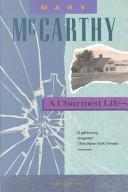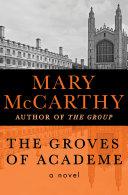Works
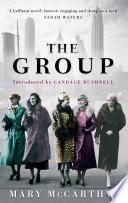
The Group
Mary McCarthy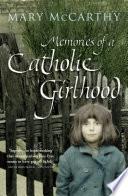
Memories of a Catholic Girlhood
Mary McCarthy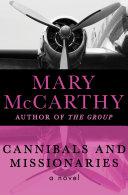
Cannibals and Missionaries
Mary McCarthyFamous Mary McCarthy Quotes
“In violence, we forget who we are.”
"Characters in Fiction", p. 276. First published in Partisan Review (March 1961)
On the Contrary: Articles of Belief 1946–1961 (1961)
"Up the Ladder from Charm to Vogue", p. 185
On the Contrary: Articles of Belief 1946–1961 (1961)
“What's the use of falling in love if you both remain inertly as you were?”
Source: Between Friends: The Correspondence of Hannah Arendt and Mary McCarthy, 1949-1975
“You mustn't force sex to do the work of love or love to do the work of sex.”
Dottie in Ch. 2
The Group (1963)
"The Hue and Cry"
The Writing on the Wall and Other Literary Essays (1970)
Mary McCarthy Quotes about people
"Up the Ladder from Charm to Vogue", p. 185. First published in two parts in The Reporter (July 18 and August 1, 1950)
On the Contrary: Articles of Belief 1946–1961 (1961)
“To be disesteemed by people you don’t have much respect for is not the worst fate.”
New York Times (27 August 1984)
“People with bad consciences always fear the judgment of children.”
"The Contagion of Ideas", p. 54
On the Contrary: Articles of Belief 1946–1961 (1961)
"Round Table, with the Damsel Parcenet"
Birds of America (1971)
"To Be a Pilgrim"
Birds of America (1971)
Mary McCarthy: Trending quotes
"My Confession", p. 102
On the Contrary: Articles of Belief 1946–1961 (1961)
"The Hue and Cry," The Writing on the Wall (1970)
Context: Calling someone a monster does not make him more guilty; it makes him less so by classing him with beasts and devils (“a person of inhuman and horrible cruelty or wickedness,” OED, Sense 4). Such an unnatural being is more horrible to contemplate than an Eichmann — that is, aesthetically worse — but morally an Ilse Koch was surely less culpable than Eichmann since she seems to have had no trace of human feeling and therefore was impassable to conscience.
"The Contagion of Ideas", p. 44. A speech delivered to a group of teachers (Summer 1952); not previously published
On the Contrary: Articles of Belief 1946–1961 (1961)
Mary McCarthy Quotes
Interview by Elisabeth Niebuhr in "The Paris Review Interviews: Writers at Work, Second Series" (1963) [the interview took place in March 1961]
Context: I suppose everyone continues to be interested in the quest for the self, but what you feel when you’re older, I think, is that — how to express this — you really must make the self. It's absolutely useless to look for it, you won’t find it, but it’s possible in some sense to make it.
As quoted in "Lady with a Switchblade" in LIFE magazine (20 September 1963) http://books.google.com/books?id=e1IEAAAAMBAJ&q=%22Europeans+used+to+say+Americans+were+puritanical+Then+they+discovered+that+we+were+not+puritans+So+now+they+say+that+we+are+obsessed+with+sex%22&pg=PA62#v=onepage
"The Writing on the Wall"
The Writing on the Wall and Other Literary Essays (1970)
Cannibals and Missionaries (1979)
"Gandhi", p. 22. First published in Politics (Winter 1948)
On the Contrary: Articles of Belief 1946–1961 (1961)
“Every word she writes is a lie, including and and the.”
Comment about Lillian Hellman in a televised interview (1979) on The Dick Cavett Show; this prompted a defamation suit against McCarthy which was dropped after Hellman's death: "If someone had told me, don't say anything about Lillian Hellman because she'll sue you, it wouldn't have stopped me. It might have spurred me on. I didn't want her to die. I wanted her to lose in court. I wanted her around for that."
"The American Realist Playwrights", p. 296. First published in Harper's Magazine (July 1961)
On the Contrary: Articles of Belief 1946–1961 (1961)
“Every age has a keyhole to which its eye is pasted.”
"My Confession", p. 74. First published in two parts in The Reporter (December 22, 1953 and January 5, 1954)
On the Contrary: Articles of Belief 1946–1961 (1961)
"To the Reader"
Memories of a Catholic Girlhood (1957)
“I am putting real plums into an imaginary cake.”
Commenting on her novel The Group. New York Herald Tribune (5 January 1964)
"To the Reader"
Memories of a Catholic Girlhood (1957)
Source: How I Grew (1987), Ch. 6
Source: The Groves of Academe (1952), Ch. I, p. 293, first lines of novel
"Characters in Fiction", p. 291
Sometimes misquoted as "We all live in suspense from day to day; in other words, you are the hero of your own story."
On the Contrary: Articles of Belief 1946–1961 (1961)
“[I]n science, all facts, no matter how trivial or banal, enjoy democratic equality.”
"The Fact in Fiction", p. 266. First published in Partisan Review (Summer 1960)
On the Contrary: Articles of Belief 1946–1961 (1961)
"My Confession", p. 76
On the Contrary: Articles of Belief 1946–1961 (1961)
Source: Intellectual Memoirs: New York 1936–1938 (1992), Ch. 2
Source: The Group (1963), Ch. 1, first lines of novel
"Everybody's Childhood"
The Writing on the Wall and Other Literary Essays (1970)
"America the Beautiful: The Humanist in the Bathtub", p. 8. First published in Commentary (September 1947)
On the Contrary: Articles of Belief 1946–1961 (1961)
“Being abroad makes you conscious of the whole imitative side of human behavior. The ape in man.”
Birds of Americs (1965), "Epistle from Mother Carey's Chicken"
Source: Memories of a Catholic Girlhood (1957), Ch. 1
Source: Intellectual Memoirs: New York 1936–1938 (1992), Ch. 2
First published in Partisan Review (July-August 1941)
Source: The Company She Keeps (1942), Ch. 3 "The Man in the Brooks Brothers Shirt", p. 70.
“I combine concrete cynicism with a sort of vague optimism.”
As quoted in "Lady with a Switchblade" in LIFE magazine (20 September 1963)
Source: Intellectual Memoirs: New York 1936–1938 (1992), Ch. 2
"America the Beautiful: The Humanist in the Bathtub", p. 18
On the Contrary: Articles of Belief 1946–1961 (1961)
"America the Beautiful: The Humanist in the Bathtub", p. 17
On the Contrary: Articles of Belief 1946–1961 (1961)
“[B]ureaucracy, the rule of no one, has become the modern form of despotism.”
"The Vita Activa", pp. 161–162
On the Contrary: Articles of Belief 1946–1961 (1961)
"The Vita Activa", p. 158. First published in The New Yorker (18 October 1958)
On the Contrary: Articles of Belief 1946–1961 (1961)
Source: How I Grew (1987), Ch. 9, last lines of book
Source: How I Grew (1987), Ch. 8
Source: How I Grew (1987), Ch. 4
Source: How I Grew (1987), Ch. 1
“You never learn a language unless you use it.”
Source: Cannibals and Missionaries (1979), Ch. 11
From Sophie Weil's diary in "Envoi"
Cannibals and Missionaries (1979)
“Ars longa vita brevis est was a truth that could not be argued with in the Eternal City.”
"Joy to the World"
Birds of America (1971)
"Greek Fire"
Birds of America (1971)
"Epistle from Mother Carey's Chicken"
Birds of America (1971)
If you start an argument with yourself, that makes two people at least, and when you have two people, one of them starts appeasing the other.
"Epistle from Mother Carey's Chicken"
Peter quotes 'Conscience doth make cowards of us all' from the 'To be, or not to be' speech in Shakespeare's Hamlet, Act 3, scene 1.
Birds of America (1971)
Polly in Ch. 11
The Group (1963)
"Up the Ladder from Charm to Vogue", p. 186
On the Contrary: Articles of Belief 1946–1961 (1961)
"My Confession", pp. 76–77
On the Contrary: Articles of Belief 1946–1961 (1961)
“Life for the European is a career; for the American, it is a hazard.”
"America the Beautiful: The Humanist in the Bathtub", p. 17
On the Contrary: Articles of Belief 1946–1961 (1961)

